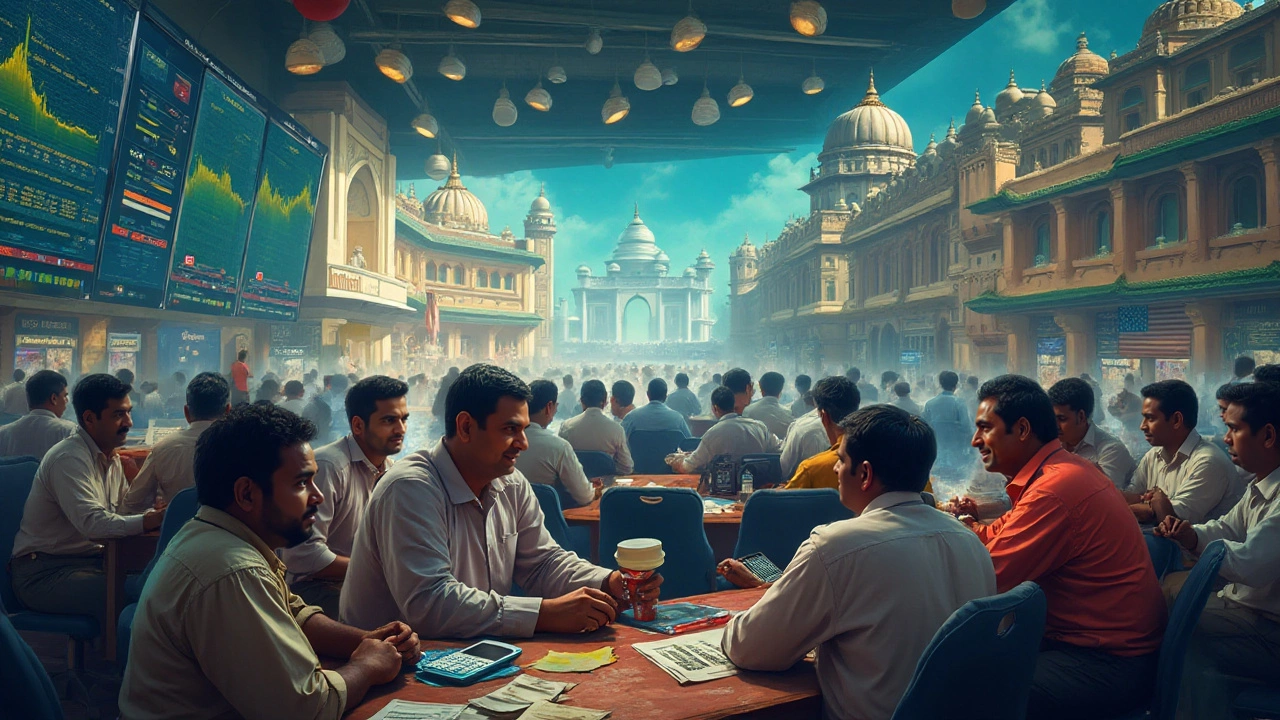Diving into the world of trade courses in India can be both an exciting and daunting experience. With each trade offering its unique landscape of challenges and successes, it's essential to understand which paths demand the most of their students. Certain trades stand out for their difficulty, not only because of the complex skill sets they require but also due to the competitive nature of their admission processes and training periods.
Among these, courses like electrical engineering and aviation mechanics are known for their rigorous curricula and emphasis on precision, demanding a high level of technical skill and commitment. Similarly, plumbing, often underestimated, requires a deep understanding of systems and practical problem-solving abilities to excel. Culinary arts, though seemingly glamorous, calls for creativity intertwined with discipline, making for a challenging yet fulfilling pursuit.
For those ready to brace these demanding trades, understanding the nuances and preparing oneself adequately can lead to rewarding career prospects. This exploration aims to shed light on what makes these trades tough and how aspiring students can arm themselves with the right tools and mindset to succeed.
- Understanding Trade Course Demands
- The Challenges of Electrical Engineering
- Mastering Plumbing: Skills and Opportunities
- Aviation Mechanics: Precision and Patience Required
Understanding Trade Course Demands
The path to mastering a trade in India is not for the faint of heart. Each trade, distinguished by its complexities, demands a unique blend of skills, dedication, and determination. As the demand for skilled workers surges, vocational education in India has witnessed a transformation, making trade courses essential for individuals aiming for a stable and fulfilling career. These courses, whether it be in sectors like electrical engineering or plumbing, demand a strong grasp of technical knowledge and a fine-tuned practical ability.
Delving into a trade course requires not just interest, but a genuine commitment to the craft. Students are expected to immerse themselves in the intricacies of their chosen field, often juggling theory with hands-on practice. For instance, India's trade educational landscape has expanded with programs that place a strong emphasis on real-world applications. The curriculum is designed to hone both the analytical and manual skills that are crucial in fields such as aviation mechanics and culinary arts.
"The future depends on what you build today," a renowned industrialist once stated, encapsulating the essential nature of these trade courses. They are foundational, building blocks leading students to not only careers but vocations where they can engineer, create, and innovate.
The selection process for these courses is often competitive, with institutions hosting entrance exams and interviews to gauge the aptitude and passion of prospective students. The rigorous screening ensures that only those who are truly prepared and passionate are admitted to these demanding courses. Perhaps it is this intense filtering process that contributes to the high levels of employability among graduates, who step out ready to take on the challenges of their chosen trade.
It is critical to acknowledge that trade courses in India are not a one-size-fits-all; they are tailored, each with its unique set of challenges and rewards. For instance, table data from a recent governmental survey showed that trades like electrical engineering have a 90% job placement rate post-certification, underscoring the necessity and success rate of these courses.
The evolving demands of the job market, especially in burgeoning sectors, continually reshape the educational requirements of these trades. It is here that trade courses play a pivotal role. They not only equip students with technical skills but also instill a sense of precision, diligence, and problem-solving—qualities that are indispensable in today's dynamic economic climate. The journey through a trade course might be arduous, yet it instills qualities no less than those required for other professional degrees.
The Challenges of Electrical Engineering
Electrical engineering stands out as one of the most demanding and intellectually rigorous trade courses in India. Its complexity is evident from the diverse range of subjects students are required to master, including circuit design, electromagnetism, and embedded programming. Each topic demands a profound understanding of both theoretical concepts and practical application, which can be overwhelming for newcomers. The curriculum is designed to test one's analytical abilities and problem-solving skills, laying the foundation for innovation in electrical engineering that drives technological advances globally.
One of the primary challenges faced by students in this field is the need to keep pace with rapid technological changes. The landscape of electrical systems is continuously evolving, with new technologies emerging frequently. To succeed, aspiring engineers need to stay abreast of the latest developments, which often means supplementing academic learning with self-directed research and practical experimentation. This demands immense dedication and time management skills, as students balance rigorous coursework with independent study. A quote from Thomas Edison remains pertinent:
"The three great essentials to achieve anything worthwhile are: Hard work, Stick-to-itiveness, and Common sense."
The industry attachment component of the program is another crucial aspect. Here, theoretical knowledge is put to the test in real-world scenarios. Students often find themselves challenged by the intricate balance required between creative engineering solutions and practical constraints like budget and timeline. Working under the guidance of seasoned professionals during internships enhances their learning experience, bridging classroom theories with tangible industry practices. Despite being taxing, these experiences are invaluable, providing a glimpse into the demanding yet rewarding career that electrical engineers can look forward to.
Practical lab sessions introduce another layer of complexity. Students are expected to design, analyze, and troubleshoot various electrical systems and components. Experimental labs can be daunting due to the pressure of producing accurate results under time constraints. There's also a safety element involved in handling electrical equipment, which adds urgency to their learning pursuits. Despite these challenges, electrical engineering can be immensely rewarding. Successful candidates emerge with skills in high demand, opening doors to careers in power generation, electronics, telecommunications, and beyond.
The competition for places in these courses is noteworthy. With an increasing number of aspirants seeking to enroll, standardized exams and stringent selection criteria act as gatekeepers ensuring only the most prepared enter these programs. This competition drives students to bolster their academic profiles from early on, emphasizing math and physics, which form the backbone of electrical engineering. It is not only about acquiring knowledge but also showcasing consistent academic excellence to gain a foothold in this esteemed field.
Once in the field, professionals must continuously upgrade their skills through workshops, certifications, and additional certifications. Continuing education is a lifetime commitment for those pursuing this career path, ensuring they remain at the forefront of innovation. The path is challenging and requires a significant investment of time and effort, but the rewards, both personal and professional, make the journey worthwhile for those with a passion for bringing electrical concepts to life.

Mastering Plumbing: Skills and Opportunities
Plumbing, often seen as a behind-the-scenes line of work, plays a critical role in ensuring that modern society functions smoothly. Whether it involves laying the intricate network of pipes in a skyscraper or ensuring safe water supply and sanitation systems in residential homes, the work of a plumber is indispensable. In India, where infrastructural growth is burgeoning at a rapid pace, the demand for skilled plumbers has never been higher. This heightened demand has transformed plumbing into one of the toughest trade courses to master in the nation. Aspiring plumbers must cultivate a blend of technical prowess, problem-solving ingenuity, and an unyielding commitment to learning the trade's intricacies and methodologies.
Starting with the basics, plumbing education begins with a meticulous understanding of various piping systems, the materials used, and the principles governing fluid dynamics. Apprentices are typically acquainted with different types of plumbing installations, including water supply, drainage systems, and gas piping. A keen eye for detail is vital, as even the slightest miscalculation or misalignment can lead to significant setbacks. It is also essential to have a firm grasp of plumbing safety protocols, as the job often requires working in potentially hazardous environments. To address the need for formal training, institutions across India have begun to offer comprehensive courses that cover both the practical and theoretical aspects of plumbing, making them more accessible to students passionate about the trade.
What sets the plumbing trade courses apart is their emphasis on hands-on experience. Real-world troubleshooting tasks form a core part of the curriculum — students find themselves repairing leaks, unclogging drains, and installing complex fixtures under the guidance of seasoned professionals. Many institutes offer apprenticeships with established plumbing companies, giving students firsthand exposure to the multifaceted challenges they will encounter in their careers. According to a report released by the Ministry of Skill Development and Entrepreneurship, there is an expected surge of around 15% in demand for qualified plumbers over the next five years, suggesting ample opportunities for those who master the craft.
"Plumbing is not just about pipes and taps; it's about ensuring the health, safety, and sustainability of our communities," says Suresh Kumar, a respected industry veteran.
Given the complexities and demands of this line of work, prospective plumbers need to be resilient and adaptable. A typical day can range from dealing with intricate installation plans to responding to urgent repair requests. Therefore, flexibility is crucial. In addition, effective communication skills are vital to liaise with clients, architects, and construction teams, ensuring that projects are delivered both on time and to specification. For those interested in further specialization, opportunities abound in areas like eco-friendly plumbing solutions and the installation of high-efficiency systems, both burgeoning fields that align with global sustainability goals. As technology continues to evolve, so too does plumbing; incorporating digital tools like smart leak detectors and energy-efficient systems adds another layer to what students must learn. This commitment to continual learning and adaptation stands as a testament to the dynamic and ever-evolving nature of the plumbing industry.
Aviation Mechanics: Precision and Patience Required
Venturing into the field of aviation mechanics is not a decision to be taken lightly. This trade, essential for the safety and efficiency of air travel, demands not just skill and knowledge, but a high degree of precision and patience. The work entails detailed inspection and maintenance of aircraft, involving everything from engines and hydraulic systems to electrical circuits and airframes. Even the smallest oversight can lead to serious consequences, which underscores the critical nature of this job.
Aspiring aviation mechanics in India usually begin their career path with specialized trade courses offered by various aviation academies and technical institutes. These programs typically cover a wide range of topics, including aircraft maintenance, repair techniques, and safety regulations. Students learn the intricacies of various aircraft systems, and practical sessions are a core part of their training, allowing them to gain hands-on experience. The intensity of the training is often accompanied by a demanding certification process, which involves both practical assessments and theoretical exams.
The role of an aviation mechanic often involves solving complex mechanical problems, requiring an analytical mindset and a strong foundation in mechanics. According to a report by the Directorate General of Civil Aviation (DGCA), the demand for qualified aircraft maintenance engineers is expected to grow significantly in the coming years, reflecting the expanding aviation industry in India. Given this potential for career growth, many young students are drawn to this field, eager to contribute to the realm of air travel while securing a promising career.
"In aviation maintenance, meticulous attention to every detail is the rule, as each component plays a vital role," noted Air Commodore Sanjeev Kumar, an esteemed aviation expert.
Those who succeed in the field of aviation mechanics often possess a unique combination of technical expertise, problem-solving skills, and an unwavering commitment to perfection. It's important for students to be prepared for the challenges and responsibilities that come with this role. A strong work ethic, combined with the ability to work well under pressure, is essential. Considering the critical nature of their work, aviation mechanics often work beyond standard hours and may be on call to address emergencies. This trade is not just about technical ability; it is about dedication, precision, and a keen awareness of the safety implications of their work.
For those with a passion for aviation and mechanics, stepping into this trade offers a rewarding career that is always evolving. New advancements in aviation technology mean that mechanics must be lifelong learners, continuously updating their skills and knowledge. With the right mindset and dedication, they can build a career that not only supports their personal growth but also plays a crucial role in ensuring the safety and reliability of air travel globally. A well-thought-out action plan and continuous learning are key to thriving in this challenging yet fulfilling trade.



